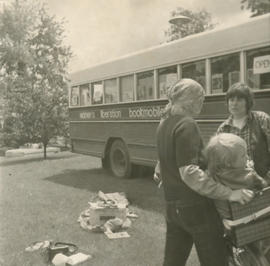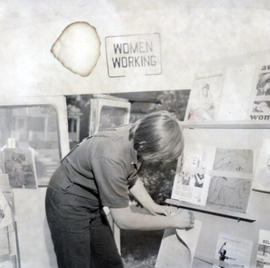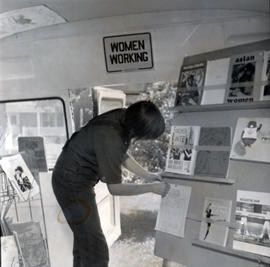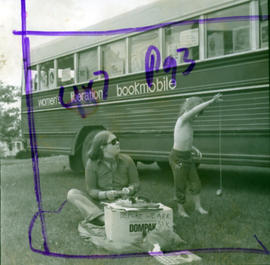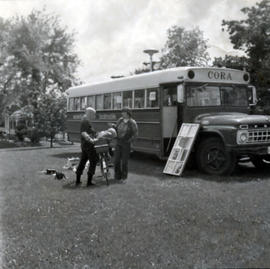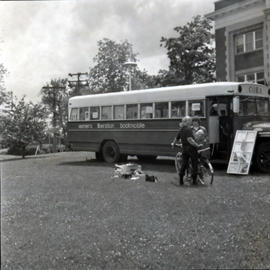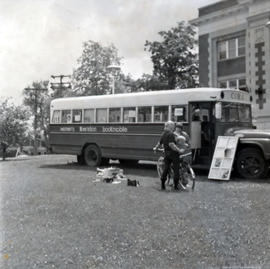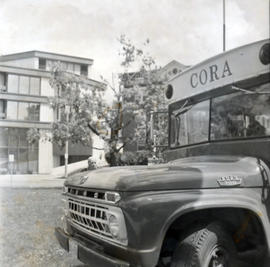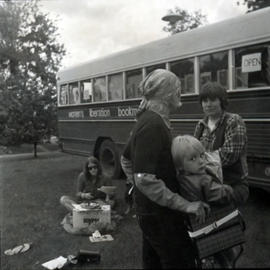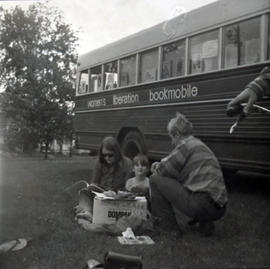Title and statement of responsibility area
Titel
The Women's Liberation Bookmobile fonds
Algemene aanduiding van het materiaal
- Graphic materials
Parallelle titel
Overige titelinformatie
Feminist Bookmobile
Title statements of responsibility
Titel aantekeningen
Beschrijvingsniveau
Fonds
archiefbewaarplaats
referentie code
CA ON0034 10-015
Editie
Editie
Edition statement of responsibility
Class of material specific details area
Statement of scale (cartographic)
Statement of projection (cartographic)
Statement of coordinates (cartographic)
Statement of scale (architectural)
Issuing jurisdiction and denomination (philatelic)
Datering archiefvorming
Datum(s)
-
1974-1975 (Vervaardig)
Fysieke beschrijving
Fysieke beschrijving
1.7 cm of textual records
9 photographs ; 2 contact sheets
9 photographs ; 2 contact sheets
Publisher's series area
Title proper of publisher's series
Parallel titles of publisher's series
Other title information of publisher's series
Statement of responsibility relating to publisher's series
Numbering within publisher's series
Note on publisher's series
Archivistische beschrijving
Naam van de archiefvormer
(1974-1975)
Institutionele geschiedenis
"CORA was the creation of Judith Quinlan, Boo Watson and Ellen Woodsworth, three young women from Toronto who began planning the feminist bookmobile in 1973. They raised funds, promoted their plan, and bought and outfitted an old school bus, transforming it into a mobile library to promote information about women. A government grant provided the funding which got the wheels turning for the bus to begin its travels through rural Ontario in 1974.
Four other women joined them for the summer. “Women’s Liberation Bookmobile” was painted in large letters on CORA’s side. Inside the bus, racks held books (for sale, loan and to give away) by, for and about women, their history and the growing women’s liberation movement.
CORA was named for E. Cora Hind, a pioneer suffragist, grain grower and writer. The motivation for the travelling bookmobile was to make women’s books, periodicals and newspapers more readily available to women in small towns. Judith and Ellen wanted to help women in isolated situations find each other, facilitate communication and demystify women’s liberation, encourage schools, libraries and community centres to be aware of women’s resources and materials, and encourage women to write about their own experiences.
The women who operated CORA worked collectively, with a flexible attitude always open to new ideas. They would arrive in town, displaying their, “Women Working” sign, choose a conspicuous parking spot and then haggle with town officials for permission to park. Then they would set up, using an outdoor display rack (until it was run over in Huntsville!), distributing flyers about CORA, contacting local media, directly leafleting on the town streets.
Many women, young and old, from all backgrounds, visited CORA. Women’s groups were beginning to form in some locations, and CORA’s staff participated in meetings. The bookmobile carried information from women’s centres across Ontario and gave away literature. Women were delighted to see CORA the feminist bookmobile in their town.
The adventures of CORA were recounted in a Toronto feminist newspaper, The Other Woman, in 1975. In one town, Boo and Ellen got thrown out of the pool hall because, “there was no women’s washroom.” Camp counselors came and talked. One said, “This night might change my whole life.” The presence of CORA, the Feminist Bookmobile, in that summer of 1974, turned heads and raised consciousness.
-
CORA est la création de Judith Quinlan, Boo Watson et Ellen Woodsworth, trois jeunes femmes de Toronto qui ont commencé à planifier le bibliobus féministe en 1973. Elles ont collecté des fonds, fait la promotion de leur projet, acheté et aménagé un vieux bus scolaire qu'elles ont transformé en bibliothèque mobile pour promouvoir l'information sur les femmes. Une subvention gouvernementale leur fournit le financement nécessaire pour que le bus commence à parcourir les régions rurales de l'Ontario en 1974.
Quatre autres femmes les rejoignent pour l'été. Le nom ""Women's Liberation Bookmobile"" (bibliobus de la libération des femmes) est peint en grosses lettres sur le flanc du CORA. À l'intérieur du bus, des étagères contenaient des livres (à vendre, à prêter et à donner) écrits par, pour et sur les femmes, leur histoire et le mouvement de libération des femmes en plein essor.
CORA a été baptisé en l'honneur d'E. Cora Hind, une pionnière suffragiste, céréalière et écrivaine. La motivation de ce bibliobus itinérant était de rendre les livres, périodiques et journaux féminins plus facilement accessibles aux femmes des petites villes. Judith et Ellen voulaient aider les femmes isolées à se retrouver, faciliter la communication et démystifier la libération des femmes, encourager les écoles, les bibliothèques et les centres communautaires à connaître les ressources et le matériel destinés aux femmes, et encourager les femmes à écrire sur leurs propres expériences.
Les femmes qui géraient CORA travaillaient collectivement, avec une attitude flexible et toujours ouverte aux nouvelles idées. Elles arrivaient en ville en arborant leur panneau ""Women Working"", choisissaient une place de parking bien visible et marchandaient avec les fonctionnaires de la ville pour obtenir l'autorisation de se garer. Puis elles s'installaient, utilisant un présentoir extérieur (jusqu'à ce qu'il soit écrasé à Huntsville !), distribuant des dépliants sur l'ACRO, contactant les médias locaux, distribuant directement des tracts dans les rues de la ville.
De nombreuses femmes, jeunes et moins jeunes, de tous horizons, ont visité l'ACRO. Des groupes de femmes commençaient à se former dans certains endroits et le personnel de l'association participait aux réunions. Le bibliobus transporte des informations provenant des centres de femmes de tout l'Ontario et distribue de la documentation. Les femmes sont ravies de voir CORA, le bibliobus féministe, dans leur ville.
Les aventures de CORA ont été relatées dans un journal féministe de Toronto, The Other Woman, en 1975. Dans une ville, Boo et Ellen ont été expulsées de la salle de billard parce qu'il n'y avait pas de toilettes pour femmes. Les conseillers du camp sont venus parler. L'une d'entre elles a déclaré : ""Cette nuit pourrait changer toute ma vie"". La présence de CORA, le bibliobus féministe, au cours de cet été 1974, a fait tourner les têtes et a éveillé les consciences."
Four other women joined them for the summer. “Women’s Liberation Bookmobile” was painted in large letters on CORA’s side. Inside the bus, racks held books (for sale, loan and to give away) by, for and about women, their history and the growing women’s liberation movement.
CORA was named for E. Cora Hind, a pioneer suffragist, grain grower and writer. The motivation for the travelling bookmobile was to make women’s books, periodicals and newspapers more readily available to women in small towns. Judith and Ellen wanted to help women in isolated situations find each other, facilitate communication and demystify women’s liberation, encourage schools, libraries and community centres to be aware of women’s resources and materials, and encourage women to write about their own experiences.
The women who operated CORA worked collectively, with a flexible attitude always open to new ideas. They would arrive in town, displaying their, “Women Working” sign, choose a conspicuous parking spot and then haggle with town officials for permission to park. Then they would set up, using an outdoor display rack (until it was run over in Huntsville!), distributing flyers about CORA, contacting local media, directly leafleting on the town streets.
Many women, young and old, from all backgrounds, visited CORA. Women’s groups were beginning to form in some locations, and CORA’s staff participated in meetings. The bookmobile carried information from women’s centres across Ontario and gave away literature. Women were delighted to see CORA the feminist bookmobile in their town.
The adventures of CORA were recounted in a Toronto feminist newspaper, The Other Woman, in 1975. In one town, Boo and Ellen got thrown out of the pool hall because, “there was no women’s washroom.” Camp counselors came and talked. One said, “This night might change my whole life.” The presence of CORA, the Feminist Bookmobile, in that summer of 1974, turned heads and raised consciousness.
-
CORA est la création de Judith Quinlan, Boo Watson et Ellen Woodsworth, trois jeunes femmes de Toronto qui ont commencé à planifier le bibliobus féministe en 1973. Elles ont collecté des fonds, fait la promotion de leur projet, acheté et aménagé un vieux bus scolaire qu'elles ont transformé en bibliothèque mobile pour promouvoir l'information sur les femmes. Une subvention gouvernementale leur fournit le financement nécessaire pour que le bus commence à parcourir les régions rurales de l'Ontario en 1974.
Quatre autres femmes les rejoignent pour l'été. Le nom ""Women's Liberation Bookmobile"" (bibliobus de la libération des femmes) est peint en grosses lettres sur le flanc du CORA. À l'intérieur du bus, des étagères contenaient des livres (à vendre, à prêter et à donner) écrits par, pour et sur les femmes, leur histoire et le mouvement de libération des femmes en plein essor.
CORA a été baptisé en l'honneur d'E. Cora Hind, une pionnière suffragiste, céréalière et écrivaine. La motivation de ce bibliobus itinérant était de rendre les livres, périodiques et journaux féminins plus facilement accessibles aux femmes des petites villes. Judith et Ellen voulaient aider les femmes isolées à se retrouver, faciliter la communication et démystifier la libération des femmes, encourager les écoles, les bibliothèques et les centres communautaires à connaître les ressources et le matériel destinés aux femmes, et encourager les femmes à écrire sur leurs propres expériences.
Les femmes qui géraient CORA travaillaient collectivement, avec une attitude flexible et toujours ouverte aux nouvelles idées. Elles arrivaient en ville en arborant leur panneau ""Women Working"", choisissaient une place de parking bien visible et marchandaient avec les fonctionnaires de la ville pour obtenir l'autorisation de se garer. Puis elles s'installaient, utilisant un présentoir extérieur (jusqu'à ce qu'il soit écrasé à Huntsville !), distribuant des dépliants sur l'ACRO, contactant les médias locaux, distribuant directement des tracts dans les rues de la ville.
De nombreuses femmes, jeunes et moins jeunes, de tous horizons, ont visité l'ACRO. Des groupes de femmes commençaient à se former dans certains endroits et le personnel de l'association participait aux réunions. Le bibliobus transporte des informations provenant des centres de femmes de tout l'Ontario et distribue de la documentation. Les femmes sont ravies de voir CORA, le bibliobus féministe, dans leur ville.
Les aventures de CORA ont été relatées dans un journal féministe de Toronto, The Other Woman, en 1975. Dans une ville, Boo et Ellen ont été expulsées de la salle de billard parce qu'il n'y avait pas de toilettes pour femmes. Les conseillers du camp sont venus parler. L'une d'entre elles a déclaré : ""Cette nuit pourrait changer toute ma vie"". La présence de CORA, le bibliobus féministe, au cours de cet été 1974, a fait tourner les têtes et a éveillé les consciences."
Geschiedenis beheer
Material donated by Betty Gibb, Toronto Public Library, April 14, 1994.
Bereik en inhoud
The fonds consists of documents relating to the creation and the tour of the Women's Liberation Bookmobile also know as the Cora Bookmobile.
-
Le fonds est constitué de documents relatifs à la création et à la tournée du Bibliobus de la libération des femmes, également connu sous le nom de Bibliobus Cora.
-
Le fonds est constitué de documents relatifs à la création et à la tournée du Bibliobus de la libération des femmes, également connu sous le nom de Bibliobus Cora.
Aantekeningen
Materiële staat
Directe bron van verwerving
Betty Gibb
Ordening
Taal van het materiaal
- Engels
Schrift van het materiaal
Plaats van originelen
Beschikbaarheid in andere opslagformaten
Restrictions on access
Documents are open.
Termen voor gebruik, reproductie en publicatie.
Some restrictions could apply considering the fragility of the documents.
Toegangen
Associated materials
See the CWMA collection (10-001), Photographs Series.
Aanvullingen
Alternative identifier(s)
Standaard nummer
Standaard nummer
Trefwoorden
Naam ontsluitingsterm
Genre access points
Beheer
Identificatie van het beschrijvingsrecord
Identificatiecode van de instelling
ON0034
Regels of conventies
RAD
Status
Finale
Niveau van detaillering
Datering van aanmaak, herziening of verwijdering
Taal van de beschrijving
- Engels

